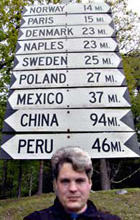Subscribe to the blog 
|
 |
 |
 |
 |
 |
Find a Flight Consider a Consolidator Rent a Car Pick a Railpass Book a Vacation Reserve a Room Get Gear |
|
||||||
|
Getting About (cont'd) << back Underground (Tube) - The metropolitan, or "subway," train system that tunnels and twists its way beneath the streets of London. You begin to feel like a gopher traveling around London. You spend most of your day either in the trains themselves or walking through the often long tunnels connecting the different lines, popping your head above ground just long enough to take in the occasional historic monument of museum, then twitching your tail and ducking back down into the hole to tunnel off somewhere else. The Underground system is very well laid out and interconnected, and it is very easy to get around to everywhere you want to go, but take my advice: forego the Tube on occasion and take one of those red, double decker, Roadmaster busses. They are much easier to get on going the wrong way, but you'll feel a whole lot better, get to see more of the city as you go along, plus you get to ride up on the top deck, which is fun. Way Out - This is how they indicate the, well, the way out of a building. Some Brits visited Berkeley during the Sixties, you see, and expanded their minds to such frightening extents that, when they returned to England, they got the vocabulary a bit off. But since "way out" was close enough to "far out" as makes no odds no one complained, and once the English got all properly sober again in the late 70s, they decided to dust off these words and put them to good use on exit signs all across the country. Zebra Crossing - They're black-and-white striped, live at street corners, and let people walk all over them all day long. I'll let you figure this one out.
Boot - This is how the English term the trunk of the car, following a rather odd British habit of trying to clothe the things they encounter in everyday life, like the "bonnet" above and "jacket potatoes." Bumper - Not that anyone usually gets them straight in American English anyway, but this is what the British call a car's fender (you know-that wide curved bit that goes up and over the top of the wheel), not that thin business of chrome and rubber that people who park by the braille method rely on so they don't dent back of the car in front of them or the front of the car in back of them. Car Hire - Should you still be silly enough to want to drive about in England, you'll have to go to a "car hire" and "hire a car." I don't think the British "rent" anything; they "let" their hotel rooms and flats, they "hire" their cars, they "borrow" their library books...where will it all end! Carriageway - A rather quaintly old-fashioned word for "highway" that almost makes you expect to see some Amish people riding in a horse and buggy when you come around the next bend in the road. Diversion - The classic diversion is when you throw a handful of pebbles over near some oil drums so that the machine gun-toting Bad Guys will go over to investigate and you can sneak up and free your P.O.W. buddies trapped on the inside. Or at least, that's how it works for Rambo and Chuck Norris. more >> getting
about | food | pubs
& drinking | money & shopping |

